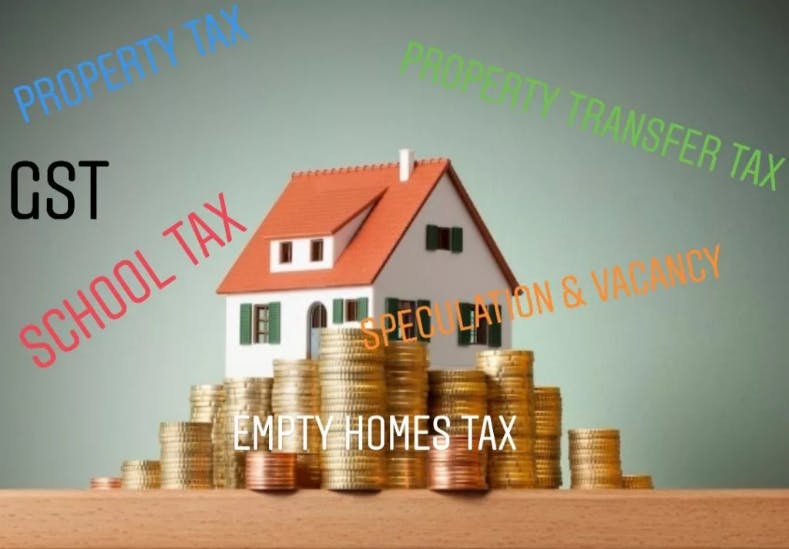Real Estate Taxes The last 18 months has not been friendly for real estate owners in BC. Many new taxes were implemented by both the provincial government and the City of Vancouver, and other taxes were increased or modified. Even as realtors, who deal with these taxes on a daily basis, it can be confusing. To help reduce the confusion, we have summarized the 6 main taxes that property owners in BC need to be aware of. GSTAmount: 5% Who pays: all purchasers buying brand new (or substantially renovated) properties How often: paid once on completion Where the money goes: Government of Canada Exemptions: none, but there are some rebates for properties under $450,000 Property Transfer TaxAmount: 1% on the first $200,000, 2% on the amount between $200,000 and $2,000,000, 3% on the amount between $2,000,000 and $3,000,000; and 5% on the amount over $3,000,000 Who pays: all purchasers How often: paid once on completion Where the money goes: Government of BC Exemptions: yes, see here: https://info.bcassessment.ca/Services-products/property-classes-and-exemptions/understanding-property-classes-and-exemptions*There is an additional 20% tax (the “Foreign Buyers Tax”) that is payable by foreign nationals, foreign corporations or taxable trustees. This tax applies to all properties in the Greater Vancouver Regional District, Capital Regional District, Fraser Valley Regional District, Regional District of Central Okanagan and Regional District of Nanaimo. Property TaxesAmount: varied depending on the property’s municipality, but property taxes are based on the property’s assessed value Who pays: all property owners in BC How often: annually Where the money goes: Municipality Exemptions: yes, see here: https://vancouver.ca/home-property-development/will-your-home-be-taxed.aspxSchool TaxAmount: 0.2% on assessed value between $3,000,000 and $4,000,000, and 0.4% on the assessed value over $4,000,000 Who pays: all residential property owners in BC when the property’s assessed value is over $3,000,000 How often: annually Where the money goes: Municipality Exemptions: yes, the additional school tax does not apply to non-stratified rental buildings with four or more housing units Speculation and Vacancy TaxAmount: For 2018, the tax rate is 0.5% of the property’s assessed value for all properties subject to the tax. For 2019 and subsequent years, the tax rate is 0.5% for Canadian citizens or permanent residents of Canada who are not members of a satellite family, and 2% for foreign owners and satellite families. Satellite family: People who declare LESS than 50% of their total combined household income for the year on Canadian income tax returns. This could apply to you even if you are a Canadian citizen or B.C. resident. So, something to note here: whereas the Canadian income tax system is based on residency, this provincial Speculation and Vacancy tax relies on how much the % of world income is earned in Canada versus elsewhere. If the majority (50% or more) is earned in Canada, you are considered NOT a satellite member of the family. Who pays: owners of properties in the taxable regions of BC (see here) where the property is not their principal residence and has not been rented for at least 6 months of the year How often: annually Where the money goes: Government of BC Exemptions: yes, see here: https://www2.gov.bc.ca/gov/content/taxes/property-taxes/speculation-and-vacancy-tax/exemptions-speculation-and-vacancy-taxEmpty Homes TaxAmount: 1% of the property’s assessed value Who pays: owners of properties in the City of Vancouver that were not used as a principal residence or rented for at least six months of the year How often: annually Where the money goes: City of Vancouver Exemptions: yes, see here: https://vancouver.ca/home-property-development/will-your-home-be-taxed.aspx Also, please remember to report any real estate you disposed of in the tax year by reporting it in Schedule 3 of your T1 General. Your principal residence is exempt from being tax when you dispose of it. Meaning, you don’t have to pay tax on the gain when you sell. It is ONLY exempt when that property is solely your principal residence for EVERY YEAR you owned it. So, if your home was not your principal residence for every year you owned it, there could be a capital gain on it you have to include in your income. You can also designate your home as the principal residence even if you were not a resident of Canada for the entire time you owned the designated property by completing form T2091: Designation of a Property as a Principal Residence by an Individual (Other than a Personal Trust) https://www.canada.ca/content/dam/cra-arc/formspubs/pbg/t2091ind/t2091ind-18e.pdf Real estate is:
- vacant land
- rental property (both land and buildings)
- farm property (both lands and buildings other than qualified farm or fishing property) and
- commercial and industrial land and buildings
For more information go to www.cra.gc.ca A final thing to note, as you might have already noticed above, is that while in the English language the term Empty and Vacancy are synonymous, Vacancy tax is collected by the Provincial Government of British Columbia (part of the one combined tax Speculation and Vacancy Tax) whereas the Empty Home tax is collected by City of Vancouver.

